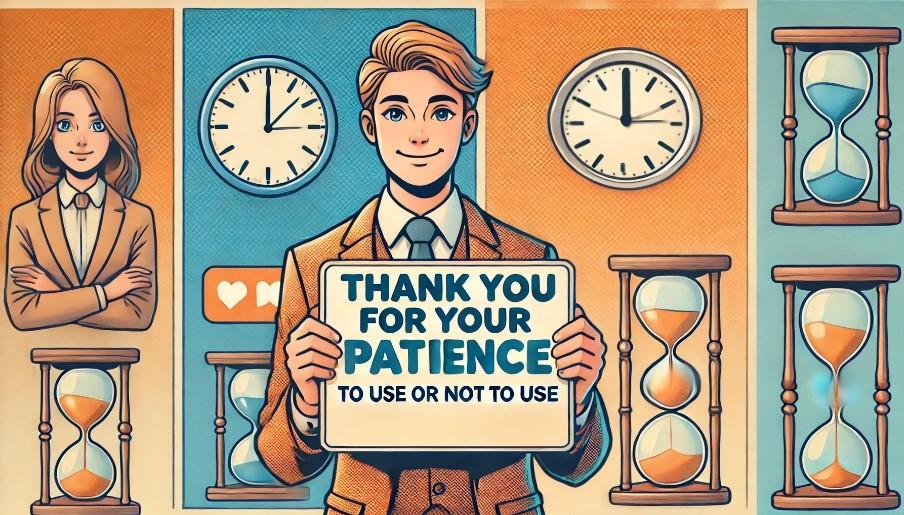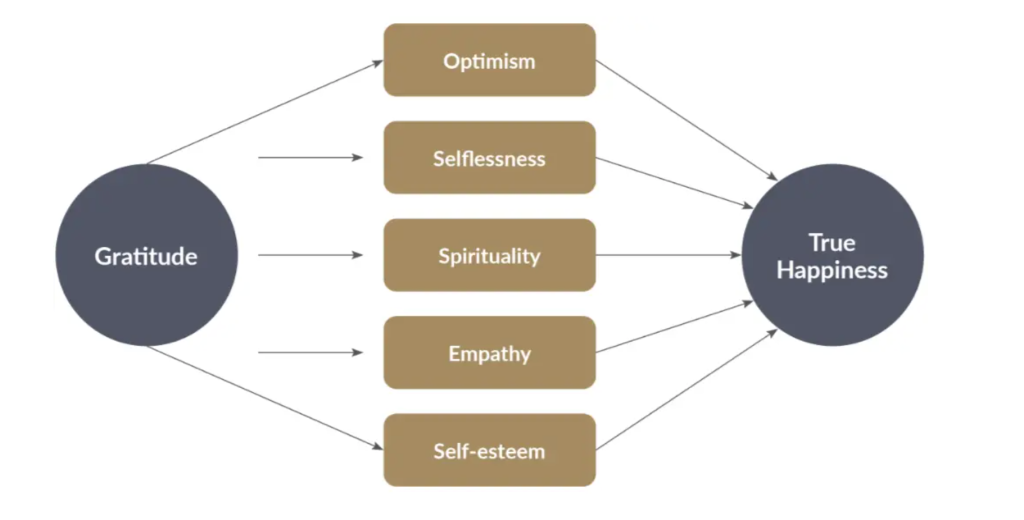“Thank you for your patience” is one of those phrases every customer has heard at one point or another. And, of course, a phrase every customer service agent has used.
As Franklin D. Roosevelt once said, “There are as many opinions as there are experts.” And the world is full of experts. In the customer service industry, “Thank you for your patience” has both, advocates and opponents. Some experts say it’s a polite and positive way to communicate with customers. Others think the phrase has become a cliché and might have a negative connotation.
So what gives? In search of a definitive answer, we’ve weighed the options. It turns out, there is no one-fits-all way to communicate with customers. An effective phrase in one customer inquiry might be an unfortunate misfit in another.
In this article, we discuss reasons to use the phrase and when to avoid it.

What does “Thank you for your patience” mean
The phrase “Thank you for your patience” is a polite and respectful way of acknowledging that someone has endured an inconvenience or delay, and you appreciate their understanding or forbearance. It’s often utilized in customer service interactions or professional settings where a process or response may have taken longer than expected. By using this phrase, you are showing empathy toward the individual’s situation, appreciating their time, and expressing gratitude for their patience and tolerance. While the phrase has the potential to seem overused or cliché, when used sincerely, it can effectively convey your esteem for their patience.
How to use “Thank you for your patience”
Expressing thanks for a client’s patience can greatly impact their satisfaction. Use a sincere tone and tailored words. Here are examples:
- “Your time is valuable. Thank you for your patience.”
- “We appreciate your patience and understanding as we resolve this.”
- “Thanks for your patience. We see it and are working quickly.”
- “Your patience shows your belief in us. We truly appreciate it.”
- “Thank you—your patience has been key to reaching this point.”
Acknowledging patience sincerely fosters trust and shows that you care and strive to resolve their issues efficiently.
“Thank you for your patience” use examples
The phrase “Thank you for your patience” suits many situations, from customer service to personal and professional contexts. Here are examples:
- Customer Service: “Thank you for your patience while we resolve this issue. We appreciate your understanding and are working hard on a solution.”
- Professional Meetings: “Thanks for your patience with the changes in meeting times. We’re optimizing our schedule for future efficiency.”
- Healthcare: “Thank you for your patience. Our staff is working hard to care for each patient promptly.”
- Restaurants: “Thank you for your patience; our kitchen is busier than usual. Your meal will be out soon.”
- Personal Setting: “This hasn’t been easy. Thank you for your patience as I work through it.”
These examples show that expressing gratitude can ease tension and show sincere appreciation.
Alternatives to “Thank you for your patience”
The phrase “Thank you for your patience” can sometimes become repetitive or seem insincere, especially when overused in customer service. To convey the same sentiment but with more effectiveness, it is advisable to mix it up with some alternative, equally polite expressions. Here are some suggestions:
1. “Your understanding is greatly appreciated during this time.”
2. “We value your time and your continued patience is very much appreciated.”
3. “I acknowledge the inconvenience this may have caused you and truly appreciate your understanding.”
4. “Thank you for your enduring patience and trust in us.”
5. “Your continued cooperation and understanding means a lot to us.”
Each of these phrases brings a new flavor to the message of gratitude and understanding, ensuring clients feel acknowledged and appreciated for their patience.
Reasons to Use “Thank You for Your Patience”
Positive reframe of an apology
Generally, the use of this phrase indicates that the customer has been waiting. Of course, we want to leave waiting to doctor’s offices and bus stations. Contact centers must work to lessen customer wait times and raise First Contact Resolution (FCR) rates. But sometimes waiting is inevitable. And it might make customers impatient and unhappy. But how the customer support agent frames the situation matters.
Psychologically, human brains pick up on positive and negative language. Then, perceives the information accordingly. In other words, focusing on the specific aspects of an experience makes a difference. When we focus on the positives, we perceive the experience as positive. When we focus on the negative, we think of the experience as crappy.
For example, let’s say the customer support agent starts with “Sorry to keep you waiting.” Immediately, the customer’s mind perceives the experience of waiting as negative. Even for a patient person that “sorry” serves as a gateway to a negative perception. And the main part of the conversation didn’t even take place yet!
Positive Psychology Researcher Michelle Gielan advocates Power Leads. These are the positive rays of sunshine that set the tone of an interaction. “Thank you for your patience,” is a power lead that communicates gratitude. A less positive, apologetic “Sorry for the delay” implies that something is wrong.
“People who connect through positive experiences not only inspire happiness in others. They cultivate more of it themselves as they create a strong feedback loop.” (Michelle Gielan)
Don’t get us wrong. A sincere apology deserves its crucially important place in customer service interactions. “A good apology earns us respect in the eyes of others, even though we may fear the opposite,” says sociologist Dr. Herriet Lerner.
Related read: Motivate Contact Center Agents: Lessons From Kindergarten
However, overusing apology diminishes its power. Instead, power-leading customer conversations with a positive vibe helps create meaningful and positive customer service interactions.
Gratitude: the Antidote to Negativity
Besides serving as a power lead, “Thank you for your patience” is an expression of gratitude. There is so much value in saying “thank you” to a customer. And that goes for both the customer and the customer service agent.
“Gratitude is the memory of the heart,” an old French proverb states. Our emotions are felt, stored, and remembered in our bodies. Gratitude makes a positive mark on our minds. Similarly, our bodies remember the positive emotions of gratitude on a physiological level. In other words, positive customer service can literally get under a customer’s skin – and stay there.

Image Source: Positive Psychology
Whatever the focus of a customer service conversation may be, gratitude can shoot any negative feelings dead on arrival. It can establish mutual respect between agents and customers.
BLOCKQUOTE: “Gratitude is an antidote to negative emotions, a neutralizer of envy, hostility, worry, and irritation. It is savoring; it is not taking things for granted; it is present-oriented.” Sonja Lyubomirsky, author of “The How of Happiness: A Scientific Approach to Getting the Life You Want”
Empathy shortcut
“Thank you for your patience” is an expression of empathy. Empathy is one of the key concepts of customer service. It’s the ability to understand the feelings of a customer. It builds emotional bridges between customers and support teams.
@justabsolutebiz 👇🏻Here are additional tips and strategies to help you empathize with frustrated customers: 👉🏻Practice active listening 🎧 – pay attention to what the customer is saying and try to understand their perspective 🤔. 👉🏻Use language that acknowledges their feelings 💬 – phrases like “I can see how that would be frustrating” 😔 or “I can understand why you’re upset” 😞 can show that you’re on their side 🙌. 👉🏻Show genuine concern ❤️ – ask follow-up questions and try to find a solution that will make the customer happy 😊. 👉🏻Take ownership of the problem 💪 – even if it’s not your fault, accepting responsibility and offering to help can go a long way in resolving the situation 🔧. 👉🏻Offer a sincere apology 🙏 – acknowledge the inconvenience and express regret 💔. 👉🏻Propose a solution 💡 – provide a clear and concise plan of action to resolve the issue. 👉🏻Follow up 🔙 – check in with the customer to make sure their issue was resolved to their satisfaction 💬💯 #smallbusinesstips #customerservicetips #mysmallbiz #mysmallbusiness #supportsmallbrand ♬ original sound – Static 2.0😄
Research shows that higher levels of empathy lead to more helpful behavior. It allows people to respond appropriately to how others are feeling. Empathy assists in creating stronger relationships. It reduces stress and enhances emotional awareness. And all of that is extremely important in the field of customer service communications. Acknowledging that the customer has, in fact, been patiently waiting serves as that bridge of empathy.
And in cases where the customer was not so patient? Well, even so, he or she is still there, waiting. Even if she was rolling her eyes the entire time on hold, the promise of a positive resolution helps. Difficult customer examples show that empathy can serve as a cure.
The catch: Use with Caution
Statistics show that waiting on hold is one of the top customer complaints. (Hubspot) “Thank you for your patience” adds a dash of positivity, gratitude, and empathy to customer service communications, whether they’re over the phone or via a medium such as a flipbook or interactive guide. The phrase serves as a sweet ingredient to conversations that have the potential of turning sour. There are, however, conditions to using this phrase.
Sincerity Matters
Humans possess a fascinating ability to detect insincerity. It’s an important social tool that we use in all of our communications. Of course, sincerity, as well as emotions and intentions, are harder to detect in written communications as opposed to spoken words. (We’ve all misunderstood and misinterpreted texts, haven’t we?)
As we established, in customer communications empathy is crucial. But empathy must come from a sincere place. It cannot be faked through canned phrases and responses. If an agent is using empathy statements in customer service responses, the trick is to empathize with the customer.
“Thank you for your patience” has to come from a sincere place. Perhaps, adding something like, “I know you have been waiting for x-number of minutes” or “I see that this issue has been persistent in your case” can help. Just like sincere communication, incorporating elements like canvas wall art photo tiles prints into your environment can create an inviting and personal atmosphere, making interactions feel more genuine.
Overuse is Deadly
One of the faux pas of commonly used phrases is that they often become cliche. And nobody likes a cliche. Overusing “thank you for your patience” can take sincerity out of the words. This rings true for both, the agent and the customer.
In cases where an agent keeps saying to all his or her customers in every interaction, the words will lose their meaning for the agent. Similarly, if a representative continues to put the customer on hold and comes back each time with this phrase, the customer is sure will lose his or her patience.
Bottom Line: Thank you For Your Patience
In the fast-paced customer service industry sometimes inquiries do not get resolved right away. In those cases, customers are forced to exercise patience. “Thank you for Your Patience” is a polite way and effective way to communicate gratitude and empathy. Its role as a power lead can set a positive tone in customer conversations. As long as the use of the phrase is sincere and sparse.




